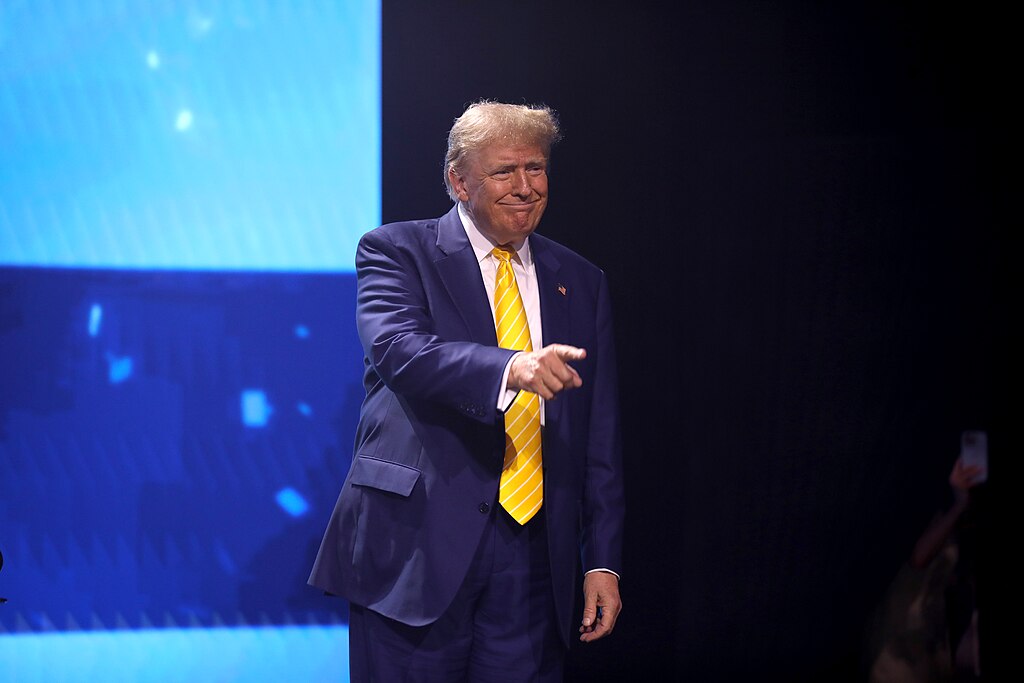In 2025, President Donald Trump's aggressive tariff policies have significantly impacted U.S. imports and exports, igniting a heated debate over their economic consequences. The administration's imposition of substantial tariffs, particularly targeting Chinese goods, has led to a complex interplay of domestic benefits and international challenges.
Imposition of Tariffs
Early in 2025, the Trump administration enacted nearly 40% tariffs on imports from China, aiming to reduce the trade deficit and bolster domestic manufacturing.
These measures extended to other trading partners, with tariffs ranging between 10% and 20% on various imported goods.
Impact on Imports
The heightened tariffs have led to a notable decline in imports, as foreign goods became more expensive for U.S. consumers and businesses. Industries reliant on imported materials, such as electronics and automotive manufacturing, have faced increased production costs, leading to higher prices for consumers. Some companies have sought alternative suppliers or shifted production domestically, though these adjustments have been met with challenges, including supply chain disruptions and increased operational expenses.
Effect on Exports
In retaliation, affected countries, notably China, have imposed their own tariffs on U.S. exports. This tit-for-tat escalation has adversely affected American farmers and manufacturers, who have seen reduced demand for their products abroad. Agricultural sectors, in particular, have suffered from decreased exports, leading to surplus supplies and falling prices domestically. The overall effect has been a contraction in export volumes, contributing to economic uncertainty in affected industries.
Economic Consequences
Economists are divided on the long-term implications of these tariff policies. Supporters argue that the tariffs protect domestic industries from unfair foreign competition and encourage self-reliance. Critics contend that the measures disrupt global supply chains, increase costs for consumers and businesses, and risk igniting a prolonged trade war with detrimental effects on the global economy. A Reuters poll of economists indicated that the tariffs could reduce China's economic growth by up to 1 percentage point, highlighting the interconnected nature of global economies.
Public Reaction
The public response has been polarized. Supporters of the tariffs view them as necessary steps to protect American jobs and industries. Critics argue that the policies lead to higher consumer prices and strain international relations. On social media, user @PatriotGuardians tweeted, "Finally, a president who stands up for American workers. #AmericaFirst." Conversely, @GlobalEconomist posted, "These tariffs are hurting our economy more than helping. We need smarter trade policies."
Outlook
As the effects of the tariffs continue to unfold, businesses and consumers are adapting to the new economic landscape. The administration remains steadfast in its approach, emphasizing the long-term benefits of a more balanced trade relationship. However, the ongoing trade tensions and their ripple effects across various sectors underscore the complexities of implementing protectionist trade policies in an interconnected global economy.



 HHS Adds New Members to Vaccine Advisory Panel Amid Legal and Market Uncertainty
HHS Adds New Members to Vaccine Advisory Panel Amid Legal and Market Uncertainty  U.S. Lawmakers Question Trump’s Iran Strategy After Joint U.S.-Israeli Strikes
U.S. Lawmakers Question Trump’s Iran Strategy After Joint U.S.-Israeli Strikes  Australia Rules Out Military Involvement in Iran Conflict as Middle East Tensions Escalate
Australia Rules Out Military Involvement in Iran Conflict as Middle East Tensions Escalate  Israel Strikes Hezbollah Targets in Lebanon After Missile and Drone Attacks
Israel Strikes Hezbollah Targets in Lebanon After Missile and Drone Attacks  Why did Iran bomb Dubai? A Middle East expert explains the regional alliances at play
Why did Iran bomb Dubai? A Middle East expert explains the regional alliances at play  Trump Says U.S. Attacks on Iran Will Continue, Warns of More American Casualties
Trump Says U.S. Attacks on Iran Will Continue, Warns of More American Casualties  Trump to Address Nation as U.S. Launches Strikes in Iran, Axios Reports
Trump to Address Nation as U.S. Launches Strikes in Iran, Axios Reports  Middle East Conflict Escalates After Khamenei’s Death as U.S., Israel and Iran Exchange Strikes
Middle East Conflict Escalates After Khamenei’s Death as U.S., Israel and Iran Exchange Strikes  Does international law still matter? The strike on the girls’ school in Iran shows why we need it
Does international law still matter? The strike on the girls’ school in Iran shows why we need it  Netanyahu Suggests Iran’s Supreme Leader Khamenei May Have Been Killed in Israeli-U.S. Strikes
Netanyahu Suggests Iran’s Supreme Leader Khamenei May Have Been Killed in Israeli-U.S. Strikes  Israel Declares State of Emergency as Iran Launches Missile Attacks
Israel Declares State of Emergency as Iran Launches Missile Attacks  U.S. Deploys Tomahawks, B-2 Bombers, F-35 Jets and AI Tools in Operation Epic Fury Against Iran
U.S. Deploys Tomahawks, B-2 Bombers, F-35 Jets and AI Tools in Operation Epic Fury Against Iran  Trump Announces U.S. Strikes on Iran Navy as Conflict Escalates
Trump Announces U.S. Strikes on Iran Navy as Conflict Escalates  Trump Launches Operation Epic Fury: U.S. Strikes on Iran Mark High-Risk Shift in Middle East
Trump Launches Operation Epic Fury: U.S. Strikes on Iran Mark High-Risk Shift in Middle East  Trump Warns Iran as Gulf Conflict Disrupts Oil Markets and Global Trade
Trump Warns Iran as Gulf Conflict Disrupts Oil Markets and Global Trade  Iran Supreme Leader Ayatollah Ali Khamenei Killed in Israeli, U.S. Strikes: Reuters
Iran Supreme Leader Ayatollah Ali Khamenei Killed in Israeli, U.S. Strikes: Reuters 
































